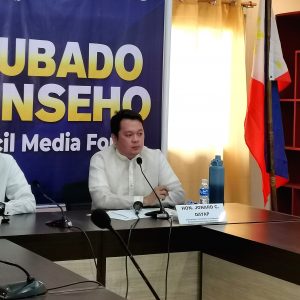A supply deal has been forged between Mindanao organic rice farmers and an American buying group for the supply of organic rice varieties, the Mindanao Development Authority (MinDA) announced over the weekend.
This developed as MinDA, in a press statement, said a Papua New Guinea group, headed by Central Province Gov. Robert Agrobe, has arrived to inspect the production area for premium rice.
This was after the agency assisted the marketing agreement between the premium rice farmers and the country for the supply of the variety. An initial supply of about 5,000 tons is expected to be sent to the country before the end of the year.
On organic rice supply agreement, MinDA quoted Andrew Bolougne, head of the American group, as telling the farmers: “Produce as much as you could and we will market it.”
It added that Bolougne’s group is also the one facilitating the export of green and matured coconut to the American market.
Bolougne said that the demand for organic rice varieties, particularly the so-called Black Rice, has been high because of their benefits compared with the traditional rice varieties.
“You cannot imagine how huge is the market demand for organic food today and we will cash in on that,” he added, promising that his group will commit to buy the produce at prices that will provide the farmers better income compared with the income that they will get in planting traditional rice varieties.
The deal will involve the marketing, on an “unlimited volume of White, Brown, Red and Black Rice.”
The agreement was part of the result of the forum that the agency organized in cooperation with local seed producer Seedworks Philippines Inc. which was also attended by farmer groups in Mindanao.
Another result of the forum was the formation of the Mindanao Organic Rice Council, a body that tasked to take steps in pushing for programs for the industry.
The agency also announced it will set up a database of organic rice farmers in Mindanao, and geotagging their farms, in its desire improve their income and face challenges that have hit the industry.
Among the key issues that the industry has faced is the Rice Tariffication Law, the law that allows the entry of foreign rice products provided tariffs are imposed and that part of the income from the implementation of the law will be used to help the local rice farmers.
The database will also contain the available seeds for production as well as the estimated production volume.
The Don Bosco Multi-Purpose Cooperative in North Cotabato, one of the few groups in Mindanao that have been selling organic rice, confirmed that organic rice production cannot even fill the demand of the local market.
Maria Helenita Gamela, vice chair and marketing officer of the confirmed, that even with the implementation of the new on the commodity, organic farmers have continued to enjoy better income.
“We have a niche market. The price is steady whole year round but we cannot produce the needed volume,” Gamela said.
The cooperative is buying paddy rice from its members at a high of P20 a kilogram, lower than the P17 a kilogram buying price for traditional rice varieties, and that the price could even go higher with the supply agreement.
Another supply agreement that was signed was for Adlay, or Adlai, another grain which is an alternative to rice and is being grown by indigenous communities in Mindanao, although MinDa did not provide details on the agreement.

